Bizarre Natural Phenomena Vol.1 - Volcanic Lightning AKA Dirty Thunderstorm

Can a thunderstorm be dirty? How's that? Storms are supposed to be accompanied by great amounts of water pouring down the skies and sometimes strong winds sweeping everything away. Well, not in this case! Dirty thunderstorms don't deal with clouds and water, they are created by erupting volcanoes and make viewers think it's a doomsday movie they're watching.
How are they formed?
First, you need a volcano, an active one. Then, the volcano must erupt so that hot gases and ashes form a vent, called a volcanic plume or an eruption column, that rises up in the sky, sometimes even penetrating stratosphere.
Now that the plume is formed it's time for some electricity magic! Within this hot cloud of ashes, rock fragments and ice particles electrical charges are generated. As the pieces of all this burning hot matter collide with each other, they produce static charges, just like in a regular thunderstorm and then...BOOM! Lightning strikes!
What are the steps to volcanic lightning?
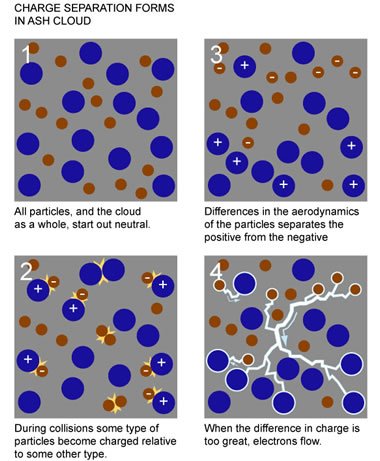
As seen in the picture, there are four steps before volcanic lightning occurs.
- Starting state: Particles are neutral or might have already been charged by some previous process.
- Charge separation: Difference in the electrical properties of the particles lead to charge separation due to collision among them or when a bigger particle splits in two.
- Segregation: A difference int the particles aerodynamics segregates the positively and negatively charged particles. In the end we have some sections mostly positive and others mostly negative charged.
- Neutralization: When charge separation produces great polarizing, the air surrounding them won't be resistant enough and electricity will flow between the positive and negative parts of the cloud. That's how lightning is formed and the charge separation is neutralized.
What causes them?
In regular thunderstorms, scientists know for sure that it's the colliding ice crystals within clouds that produce enough electric charge to trigger lightning. But, volcanic ash clouds are not that easy to observe, so scientists have been making assumptions as to where dirty thunderstorms come from.
One main theory is that static charges formed by colliding ash and rocks produce lightning. The other theory is that when a volcanic plume is too high to leave the atmosphere and reach the stratosphere, it meets with ice particles which unleash powerful jolts. If you've been paying close attention, you'd have seen that I mentioned the word ice. What on earth is ice doing in a volcanic eruption? Let's read on to find out.
Theory I: A research team led by Corrado Cimarelli (a volcanologist at Ludwig Maximilian University in Munich, Germany) studied Sakurajima volcano in Japan. The team reported in the journal Geophysical Research Letters that lightning striking near the ground is caused by ash particles.
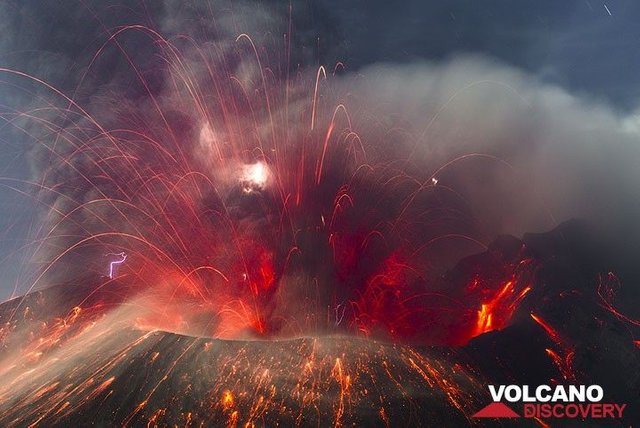
Image source: volcanodiscovery.com
Theory II: Calbuco volcano in Chile erupted in April 2015. The research team tracked the location of lightning strikes some 60 miles (about 100km) from the eruption. The bolts were about 12 miles (that's 20 km) above Earth, near the stratosphere. The scientists believed that ice was formed by the water vapor carried in the ashes at the ending of the ash cloud and that led them to think that lightning happened just like it happens in a regular thundercloud. The team published their study in Geophysical Research Letters.
A video from the eruption of Sakurajima volcano in 2016
Why is it important to measure volcanic lightning?
Studying and measuring volcanic lightning could mean a lot to volcano monitoring and avoiding potential aviation issues. According to Alexa Van Eaton (lead author of the Calbuco study and a volcanologist at the U.S. Geological Survey Cascades Volcano Observatory in Vancouver, Washington) observation of volcanic lightning after an eruption can warn us about aviation issues that are likely to happen.
Van Eaton's team studied the eruption of Alaskan Pavlof volcano and used the World Wide Lightning Location network to monitor the volcano's ash cloud. The ash from this volcano along with other southwest Alaskan volcanoes could get into international and local flight paths, causing serious problems to air transport. The team's ultimate goal was to learn how to use lightning flashes in order to gauge the power of en eruption from a long distance, since lightning reveals information on the eruption that other geophysical monitoring techniques can't see. They have observed that the amount of lightning is associated with the strength of the eruption and the likelihood of creating aviation issues. Therefore, being able to observe and gauge volcanic lightning will help calculate and avoid problems in air transport.
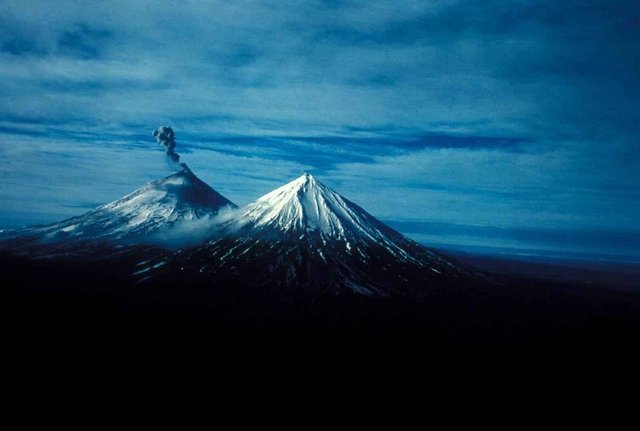
Our Earth is a special place, full of huge and little wonders! Follow me on my series of articles for more bizarre natural phenomena, because nature never seizes to surprise us!
You can check out my blog on @ruth-girl.
Until our next article, steem on, people and keep smiling!! 😄
References:
Dirty thunderstorm - wikipedia.com
Eruption column - wikipedia.com
Phases of lightning - geology.com
Volcanic lightning formation - livescience.com
UPDATED: The second article on bizarre natural phenomena is also out. You can find it here:
Bizarre Natural Phenomena Vol.2 - Bioluminescence - The art of creating light
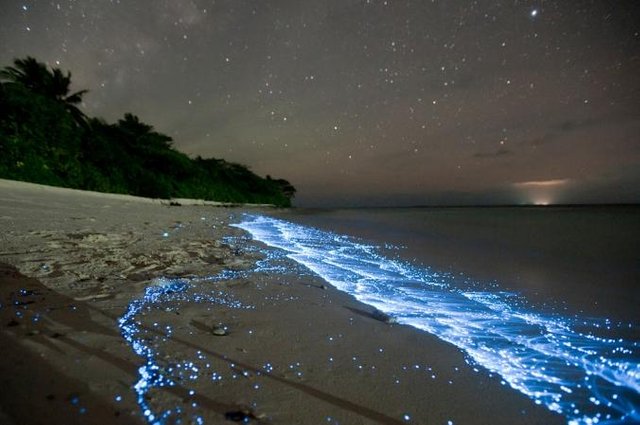
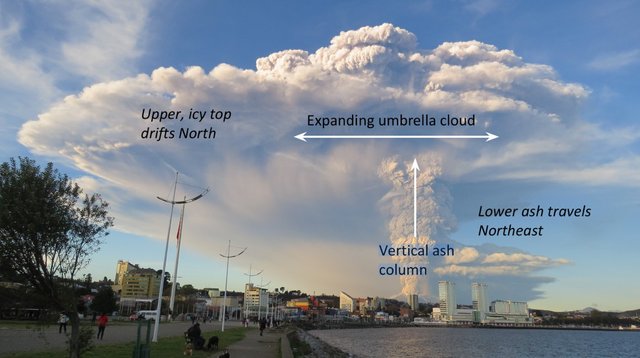
Upvoted and Resteemed by xx-votesplus, the dropAhead curation team!
Do you want more earnings?
By doing things above you will give us more STEEM POWER (SP) to give you more earnings.
Keep up the good work!
Most recent post: It is official, WE are witnesses!
Great post
Wow
@steemcleaners
Hay my good friend. Is it wrong if someone is flattering your post, then you call steemcleaner, where is your socialist soul? Do you never feel being a new person in steemit? Do not you call steemcleaner, you better teach him how to be a good steemian. And remember every human being does not escape the error, and the wheel is always spinning
Commenting a simple "wow" with an upvote, in my suspicious and heartless mind smells like spamming, does that make me such a bad person?
Cause I checked their account and it's full of one-word comments upvoted by the same account.
Thank you, my friend ,, I've seen his blog, I apologize to you, ok I will remember him, I apologize that big - his.
I hope you can forgive him because she's a new member in steemit
And have not learned properly about steemit
She is a country with me
thank you @ruth-girl
check his comment history, he is obliously comment spamming.
This gem of a post was discovered by the OCD Team!
Reply to this comment if you accept, and are willing to let us promote your gem of a post!
If you accept this, you'll be nominated and the members of the OCD team will vote on whether we'll feature your post in our next compilation post.
You can follow @ocd – learn more about the project and see other Gems! We strive for transparency.
I'm mostly curating in #science and am always glad to see quality posts like yours peeking out between the garbage and plagiarism!
Thank you for nominating me! I accept the nomination and I'd be happy if my post got to be featured by @ocd :)
First time I hear about this phenomenom. It sounds but most importantly looks very cool. Thanks for sharing
It really is! I can't imagine the thrill those scientists felt during their observations! Thanks for your kind words! More BNP articles are on their way!
This post has received a 3.13 % upvote from @drotto thanks to: @banjo.
I Resteem your post ! that great !
Thank you! Glad you liked it!
Very interesting post, I had no idea there even was lightnings from a volcano in the first place.
Me neither my friend! I recently dscovered it, that's why I made this post. :)
This is incredible. I've always been awed by the immense power of volcanoes, but I had no idea they were capable of producing lightning. Thank-you for this! Keep up the good work, and I will happily read anything you write.
@justincottle me too :)
I didn't know up until recently, that's why I decided to write about it.
Thank you for your kind words. It's nice to hear that people find your posts interesting!
I followed you, so I guess I'll see you around! :)
Thanks for resteeming!
great job .. will be checking this out .. the photography is fantastic
Thank you! Fortunately finding good-quality images for this post wasn't difficult. I hope you 'll like my other posts as well. :)